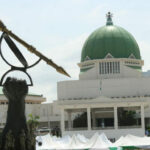The National Assembly has passed an aggregate expenditure of N21.82 trillion as the budget for the 2023 fiscal year.
This figure represents an increase of N1.3 trillion from the N20.51 trillion estimates presented by President Muhammadu Buhari to the parliament in October.
The passage followed the consideration of a report by the appropriations committee in both the Senate and House of Representatives during Wednesday’s plenary.
The budget has a deficit of N10.78 trillion, which will be funded by debt financing, N8.8 trillion; asset sales/privatization, N206bn and multi-lateral/bilateral project-tied loans, N1.77 trillion.
Dry season farmers in Taraba embark on wheat production trial
Yobe LG empowers 300 flood victims
Presenting the report, the chairman of the Senate Committee on Appropriations, Barau Jibrin, said the budget was increased to make provision for improved funding for the National Population Commission (NPC) ahead of the 2023 Census, the Independent National Electoral Commission (INEC) ahead of the 2023 general elections, the Nigerian Army, Navy, Nigeria Police Force, ministries of Agriculture, Health, Aviation, and Science and Technology.
The National Assembly also increased the oil price benchmark proposed for the budget from $70 per barrel to $75 per barrel.
It however retained other parameters as earlier proposed by the president such as the 1.69 million barrel oil production per day, N435.57 to a US dollar, 3.75% GDP growth rate and 17.16% inflation rate.
The breakdown of the budget shows that N967.48 billion is for statutory transfers; N8.32 trillion for recurrent (non-debt) expenditure while the sum of N5.97 trillion is for capital and N6.55 trillion for debt service.
From the statutory transfers, the National Judicial Council takes N165bn; Niger Delta Development Commission (NDDC), N119.93bn; Universal Basic Education, N103.28bn; Independent National Electoral Commission (INEC), N173.63bn; National Human Rights Commission, N4.5bn; North East Development Commission (NEDC), N59.03bn; Basic Health Care Fund, N51.64bn and National Agency for Science and Engineering Infrastructure (NASENI), N51.64bn.
Also, under the statutory transfers, the National Assembly’s severance/inauguration of outgoing and incoming 9th and 10th Assembly (legislators and legislative aides) got allocated N30.17bn, National Assembly Office, N30.49bn; Senate, N33.26bn; House of Representatives, N51.99bn; National Assembly Service Commission, N10.55bn; National Institute for Legislative and Democratic Studies (NILDS), N7.41bn; and Service Wide Vote, N671.3m.
A further breakdown shows that the Office of Retired Clerks and Permanent Secretaries takes N1.05bn, National Assembly Library Building N4.25bn; Constitution Review N850m; completion of NILDS headquarters N2.5bn; and construction of National Assembly Service Commission building N10bn.
Out of the N5.972 trillion proposed capital expenditure, the Ministry of Works and Housing has the lion’s share of N398.275bn; Ministry of Defence, N285.045bn; Ministry of Agriculture and Rural Development, N248.358bn; and Ministry of Education, N153.735bn.
Others are the Ministry of Health N134.909bn; Federal Ministry of Science and Technology, N132.572bn; Ministry of Finance, Budget and National Planning, N166 747bn; Office of the National Security Adviser, N70.331bn; Presidency N20.115bn; Ministry of Interior N45.622bn; Federal Ministry of Water Resources N83.256bn.
After the passage, Senate President Ahmad Lawan urged President Muhammadu Buhari to assent to the budget before the year runs out toward sustaining the January-December budget cycle implementation.
By Abdullateef Salau & Itodo Daniel Sule

 Join Daily Trust WhatsApp Community For Quick Access To News and Happenings Around You.
Join Daily Trust WhatsApp Community For Quick Access To News and Happenings Around You.

